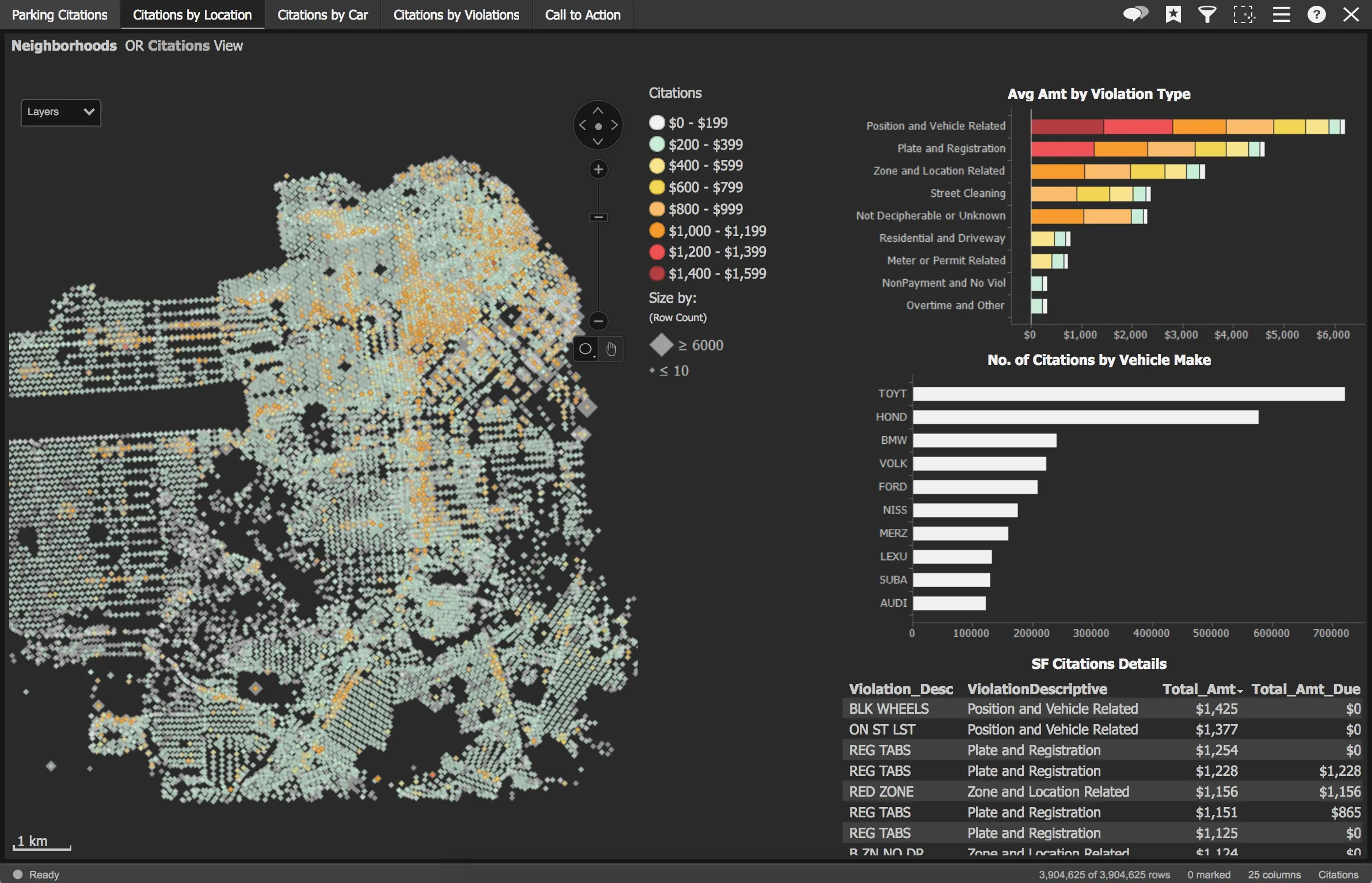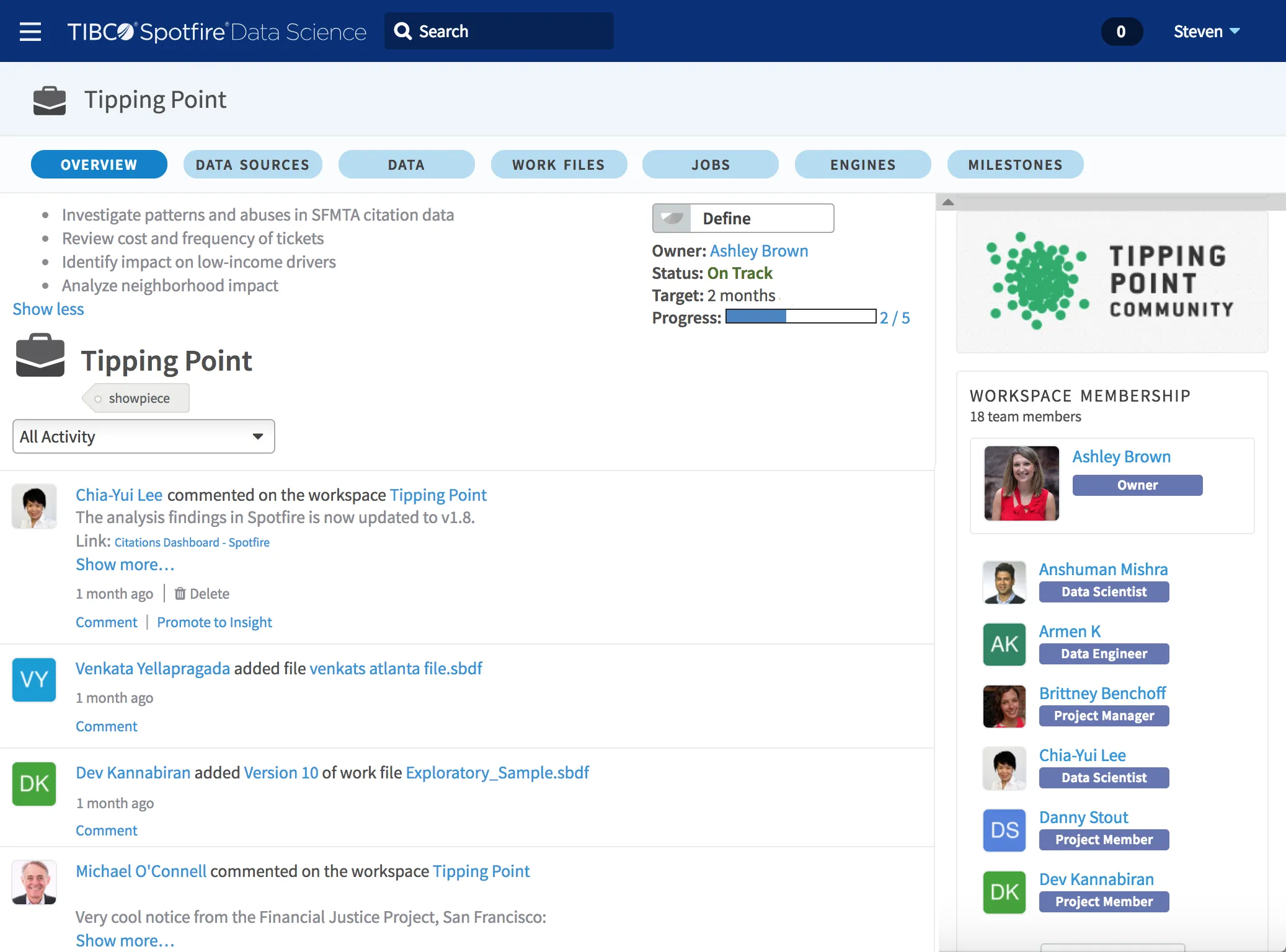How Tipping Point Is Seeking Financial Justice with TIBCO Analytics
Blog: The Tibco Blog
In March 2018, the San Francisco Municipal Transportation Agency (SFMTA) announced reforms that would alleviate the burden of parking ticket fines on low-income San Franciscans. There is increasing awareness that parking citations can result in disproportionate hardship for low income drivers, from late fees, towing, and even loss of income resulting from the impounding or sale of a vehicle. Tipping Point Community, a non-profit that fights poverty in the Bay Area, has been working hard behind the scenes to promote greater awareness of this issue, sharing statistics and recommendations with the San Francisco city government. They’ve spent the last few months crunching through some pretty big datasets to quantify just how bad the problem is.
Ashley Brown, a manager and analyst on the Impact + Learning team at Tipping Point, used TIBCO’s Spotfire Data Science platform to uncover insights from parking citation data. She took advantage of the collaborative capabilities of the platform to work alongside some of TIBCO’s own data scientists. Together, they used the point-and-click analytics tools to develop an array of statistics and visualizations that highlighted the most burdensome aspects of parking citations. The team also used TIBCO Spotfire to create dashboards for communicating the findings to other members of the organization.
The project started last year when Tipping Point came to TIBCO asking for help with analyzing the large parking datasets that it had acquired from the San Francisco MTA through the SF Sunshine Ordinance and the California Public Records Act. The analysts at Tipping Point were most comfortable with tools like Excel and Stata, so they needed a solution that was equally easy to use, but that could easily handle and clan millions of rows of citations and then combine the citation data with neighborhood attributes, demographics, towing data, and more.
They also wanted to move quickly — San Francisco founded the country’s first Financial Justice Project in early 2017, a new venture in conjunction with San Francisco’s Office of the Treasurer and Tax Collector, and Tipping Point was eager to take advantage of the City’s interest in “assessing and reforming how fees and fines impact our most vulnerable residents.” TIBCO recommended deploying Spotfire Data Science within Amazon Web Services, where it can leverage scalable cloud-based platforms like EMR and Redshift. Within a few hours, the team was able to upload datasets and produce their first data workflows.

Initially, the data scientists from Tipping Point looked for patterns in the way citations were given in different neighborhoods. But what does it mean to compare one ZIP code to another? How should they take into account the size of the area and the density of parking meters or tow away zones? So they started looking along other dimensions — the type of ticket, the make of the vehicle. And immediately they saw that tickets were actually more expensive for certain vehicle types that were perhaps correlated with low or middle incomes. Even tickets of the same type (e.g. street sweeping) had varying costs, most likely because of late fees. The team wanted to measure just how great a burden came from more expensive tickets (e.g. lapsed registrations) and late fees and tow away fines, and if that burden might be higher for low-income people not just because they had less money, but because the tickets they got were actually — in effect — more expensive.
But there was no easy way to relate the income of a driver to the vehicle listed on the citation. The most reliable way to track a driver’s details was from the VIN number, but only a small proportion of tickets had that information. The analysts could use the make of the vehicle, but that was a very weak proxy for income. Eventually, they realized that California license plates held the key — they are issued sequentially (7ABC111, 7ABC112, etc.) and generally remain with the vehicle when it is sold. So the digits on the plate can be converted into a unitless measure of age. Meanwhile, intuition suggests that vehicle age is directly correlated with income, a hypothesis confirmed by several studies (e.g. UT Austin, U.S. Department of Transportation).
The team now had a simple way to measure the impact of ticket costs on owners of aging vehicles. And the results were quite striking: for older vehicles, citations cost 14% more in general, and certain ticket types (e.g. expired registration) cost 32% more; delinquency rates were more than twice as high as the average.
These findings confirm what we hear anecdotally, of people who cannot pay tickets, who rapidly accumulate fees that can be fully half of the original fine, and who then lose their cars and the ability to get to work. Quantifying this — which tickets are most burdensome, and by how much — is the first step to making the system more fair. So TIBCO is proud to support the analysts of Tipping Point and the City employees working to change the way citations are managed.
